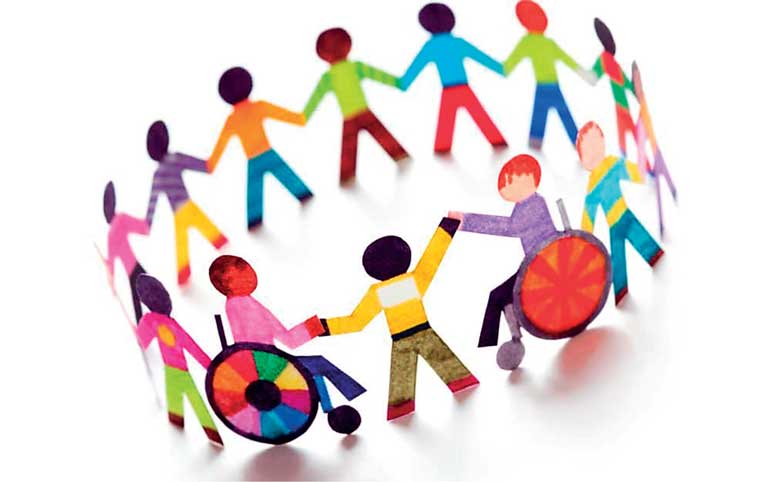Wednesday Feb 18, 2026
Wednesday Feb 18, 2026
Monday, 16 August 2021 00:00 - - {{hitsCtrl.values.hits}}

ETD produces an article from ECSSAT Lanka which in no way particularly conveys the thoughts of ETD. Although this may not be the most updated information, it provides interesting reading on the status of persons with disability in Sri Lanka. Extracts from a Question/Answer conducted by ECSSAT Lanka:
Q: What are disabled people’s rights and do they live by these rights in Sri Lanka?
The Universal Declaration of Human Rights states that all human beings are born free and equal in dignity and rights (Article 1) and that everyone is entitled to all the rights and freedoms set forth in this Declaration, without distinction of any kind (Article 2). People with disabilities therefore have the same rights as all of us, to express their views, to work, to have a reasonable standard of living, but we do not believe these rights are fully realised for people with disabilities.
This is why we are committed to enabling people with disabilities to form disabled people’s organisations at local level and at national level, to ensure that they can express their views, raise their public profile and gain greater recognition for their rights in Sri Lankan society.
Q: How many people with disabilities are there in Sri Lanka?
Regular statistical collections by the Government and other national bodies produce conflicting data and so there is no reliable official figure (on disability and many other issues). The following list of reported data therefore allows a sketch of disability to be developed rather than a detailed picture:
UNESCAP: 7% of the Sri Lankan population has a disability
UNICEF reported child disability prevalence rates that fall significantly below 10% may indicate that severe and moderate disabilities are under-recognised or under-reported, which means that children with disabilities are missing in these statistics.
Q: Do children with disabilities attend schools?
The Government in Sri Lanka intends that all children with disabilities who are able to, attend local government schools. We support the aim for inclusive education. However, in practice we know that many children with disabilities do not go to school. Some are never enrolled, others try to attend school and for many reasons drop out: lack of support, lack of transport, parents unwilling or unable to see the benefits of education for their disabled child, lack of resources, facilities, equipment and training in schools to make inclusive education a reality.
0.7% of all disabled people in Sri Lanka report having had no schooling; around 11% of disabled people passed grade 3 or lower; around 14% passed at grade 4-5; around 18% passed at grade 6-8 and around 11% at grades 9-10. Around 11% of all disabled people report having an education to O Level standard and only 3% to A level standard. The numbers of disabled people with higher educational qualifications are negligible.
We believe inclusive education is a gateway to a better future, economically and socially, for people with disabilities. School is a place for learning and play – a place with routine, structure and stimulation as well as friends.
Q: What kind of employment opportunities do disabled people have?
The Government estimates that there are around 200,000 work-eligible people with disabilities in Sri Lanka. National statistics show that around 85% of the working-age population of disabled people is not in employment. Some people may have severe barriers to employment and some may not want employment. However, the fact remains that for those that do want employment, and who may benefit from the social contact, physical and mental stimulation, income and increased self-esteem that can come from meaningful and appropriate employment, there are very limited opportunities.
Legislation in Sri Lanka says that 3% of the workforce in public services and public companies should be people with disabilities (who are able to do the jobs). We do not know of any public monitoring of this commitment.
Opportunities for vocational training are extremely limited, with only 19 Government-led vocational centres for people with disabilities across the whole island, and these offering segregated opportunities keeping disabled people apart from their non-disabled peers.
ETD – Enable The Disabled, commencing as a small CSR arm of The Management Club, quickly gained prominence due to the tireless work of its Chairperson and dedicated committees over the 15 years. A focal point of its activities is networking locally and internationally to create an environment of empathy, support and awareness through religious leaders, educational institutions, self-help organisations and policy/decision makers to break through what is sometimes thought of as ‘karma’ by shifting the emphasis away from the disability and more to the person.
The disabled are not destined to live their lives being told what to do. The goal is to enable the disabled, not on sympathetic grounds alone but with the aim of ultimately making them contribute significantly to our society. Let the disabled earn a living instead of living on the shoulders of others for that is exactly what they want – a few tools and an open attitude that will allow them to open new parameters to keep up with the rest of society. By enriching others, we enrich our own selves. ETD invites individuals and companies interested in sharing a part of this effort in whatever way their hearts, minds and capacities allow.